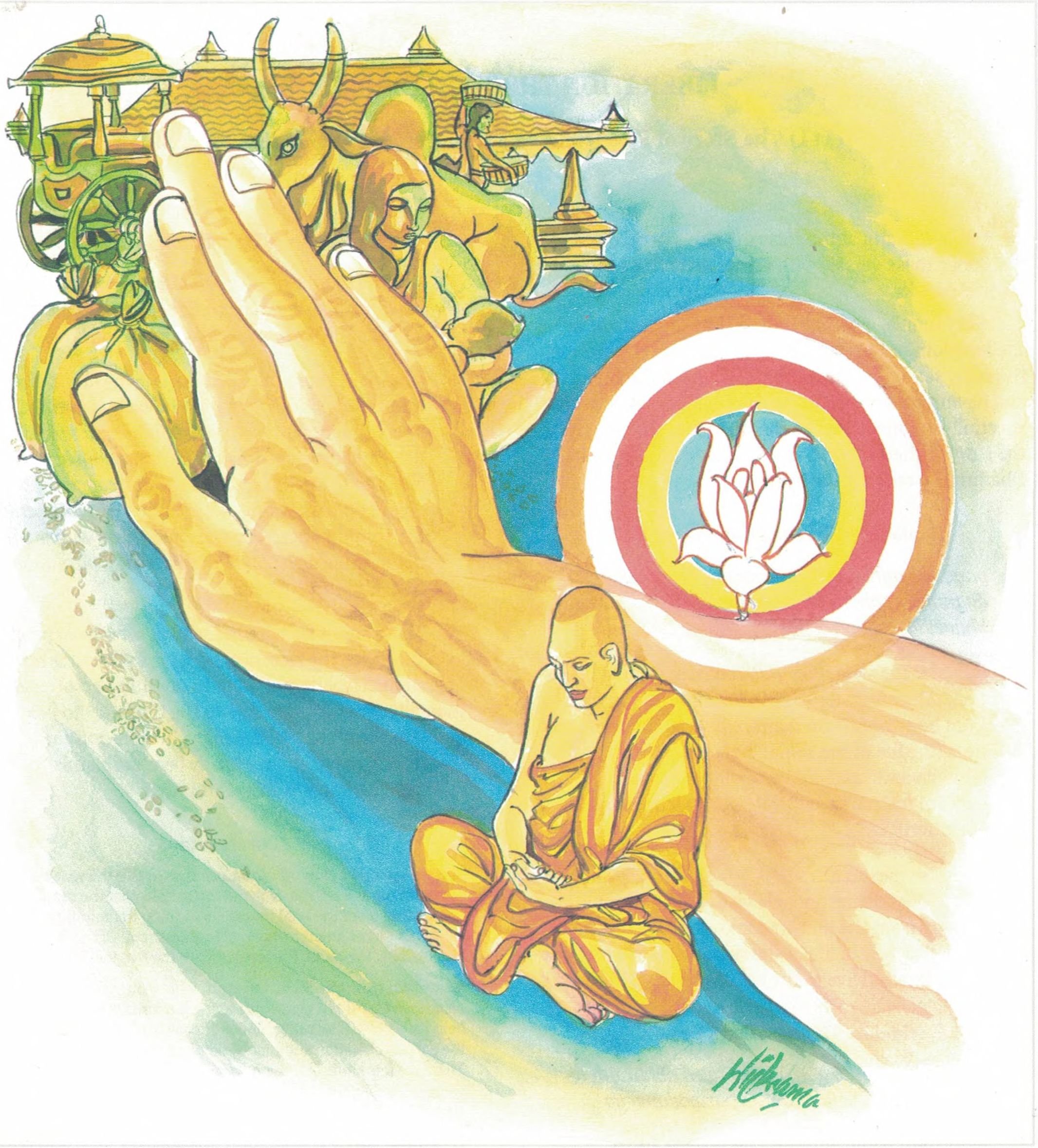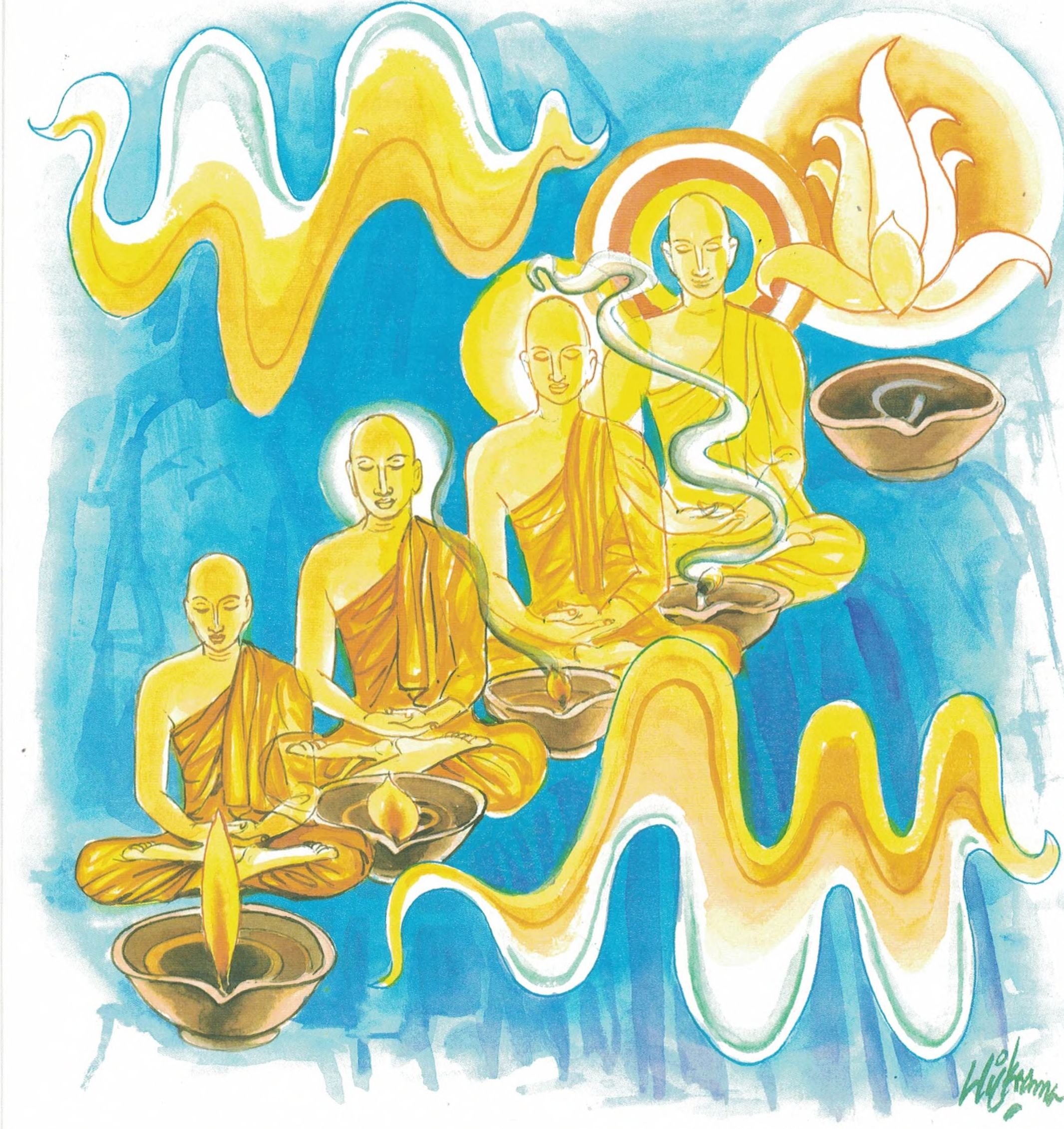Dhammapada (Illustrated)
by Ven. Weagoda Sarada Maha Thero | 1993 | 341,201 words | ISBN-10: 9810049382 | ISBN-13: 9789810049386
This page describes The Story of Five Hundred Visiting Monks which is verse 87-89 of the English translation of the Dhammapada which forms a part of the Sutta Pitaka of the Buddhist canon of literature. Presenting the fundamental basics of the Buddhist way of life, the Dhammapada is a collection of 423 stanzas. This verse 87-89 is part of the Paṇḍita Vagga (The Wise) and the moral of the story is “Abandon unwholesome views, become homeless and wisely strive for Nibbana” (first part only).
Verse 87-89 - The Story of Five Hundred Visiting Monks
Pali text, illustration and English translation of Dhammapada verse 87-89:
kaṇhaṃ dhammaṃ vippahāya sukkaṃ bhāvetha paṇḍito |
okā anokaṃ āgamma viveke yattha dūramaṃ || 87 ||
tatrābhiratimiccheyya hitvā kāme akiñcano |
pariyodapeyya attānaṃ cittaklesehi paṇḍito || 88 ||
yesaṃ sambodhiaṅgesu sammā cittaṃ subhāvitaṃ |
ādānapaṭinissagge anupādāya ye ratā |
khīṇāsavā jutimanto te loke parinibbutā || 89 ||
87. Abandoning the Dhammas dark the wise should cultivate the bright, having from home to homeless gone in solitude unsettling.
88. Let them desire that rare delight, renouncing pleasures, owning nought, those wise ones should cleanse themselves from all defilements of the mind.
89. Those who come to Wakening with mind full-cultivated, delight, no longer clinging, in relinquishing attachment: they, without pollution, radiant, in this world have reached Nibbāna.
 Abandon unwholesome views, become homeless and wisely strive for Nibbāna. |
 The wise person purifies himself, being non-attached, desireless and by forsaking pleasures. |
 Practice of the seven factors and non-attachment ensures Nibbāna. |
The Story of Five Hundred Visiting Monks
While residing at the Jetavana Monastery, the Buddha spoke these verses, with reference to five hundred visiting monks.
Fifty monks who had passed the rainy season in the kingdom of Kosala came to Jetavana at the close of the rainy season for the purpose of seeing the Buddha; and having paid obeisance to the Buddha, sat down respectfully on one side. The Buddha, after listening to the story of their experiences, instructed them in the Dhamma by reciting the stanzas.
Explanatory Translation (Verse 87)
paṇḍito yattha viveke dūramaṃ okā anokaṃ āgamma
kaṇhaṃ dhammaṃ vippahāya sukkaṃ bhāvetha
paṇḍito [paṇḍita]: the wise one; yattha viveke: in that liberation; dūramaṃ [dūrama]: difficult to take interest in; okā: from home; anokaṃ āgamma: go to homelessness (the life of the samana); kaṇhaṃ dhammaṃ [dhamma]: tainted views; vippahāya: giving up totally; sukkaṃ bhāvetha: cultivate purity (conducive to liberation)
The wise person abandons fully and totally those tainted views and questionable ways of behaviour and moves away from the known comforts of lay life into the unfamiliar way of life of the renunciate. He practises virtues conducive to the achievement of liberation.
Explanatory Translation (Verse 88)
akiñcano paṇḍito kāme hitvā tatrā abhiratiṃ
iccheyya cittaklesehi attānaṃ pariyodapeyya
akiñcano [akiñcana]: being without possessions (unattached); paṇḍito [paṇḍita]: the wise person; kāme hitvā: giving up sensual pleasures; tatrā: in that (liberation); abhiratiṃ [abhirati]: interested; iccheyya: (and) desiring; cittaklesehi: from mental defilements; attānaṃ pariyodapeyya: cleanses oneself
He takes interest in liberation. He gives up all preferences for sensualities. This way, he is without any possessions. The wise person proceeds to cleanse his mind from those defilements that blemish the mind.
Explanatory Translation (Verse 89)
yesaṃ cittaṃ sambodhiaṅgesu sammā subhāvitaṃ
ye anupādāya ādāna paṭinissagge ratā
jutīmanto te khīṇāsavā loke parinibbutā
yesaṃ [yesa]: of those (blemishless ones); cittaṃ [citta]: the mind; sambodhiaṅgesu: in the factors conducive to enlightenment; sammā subhāvitaṃ [subhāvita]: well practiced and developed; ye: they; anupādāya: without clinging to anything; ādāna paṭinissagge: in the giving up of grasping; ratā: interested; jutīmanto [jutīmanta]: the shining ones; te khiṇāsavā: those who are bereft of influences; loke: in this world; parinibbutā: have attained Nibbāna.
There are those wise individuals who have practiced extremely well the factors conducive to the attainment of liberation. They do not cling to anything emotionally or mentally. They are opposed to the tendency to be greedy and grasping. They take delight in non-grasping. They, the shining ones, who are totally bereft of blemishes, have attained liberation in this world itself.
Commentary and exegetical material (Verse 87-89)
pariyodapeyya attānaṃ cittaklesehi paṇḍito: the wise one purifies one’s mind from the defilements that blemish the mind. This is a summing up of the total process of refining the mind, so that it will be a fit instrument to explore deathlessness. Of the defilements that blemish the mind, the foremost are the five-fold hindrances.
Nīvarana: to hinder. In this context, what is meant is preventing behaviour that is not conducive to the attainment of spiritual heights. Those factors that hinder or obstruct one’s progress along the path to liberation and higher states are described as nīvarana.
There are five kinds of these hindrances. They are:
- sensual desires,
- ill-will,
- sloth and torpor,
- restlessness and worry, and
- doubts.
(1) Sensual desires
Sensual desires or attachment to pleasurable sense-objects such as form, sound, odour, taste, and contact. This is regarded as one of the Fetters, too, that bind one to saṃsāra.
An average person is bound to be tempted by alluring objects of sense. Lack of self-control results in the inevitable arising of passions. This hindrance is inhibited by one-pointedness, which is one of the five characteristics of jhānas. It is attenuated on attaining sakadāgāmi and is completely eradicated on attaining anāgāmi. Subtle forms of attachment such as rūpa rāga and arūpa rāga (attachment to realms of form and formless realms) are eradicated only on attaining arahatship.
The following six conditions tend to the eradication of sense-desires.
- perceiving the loathsomeness of the object,
- constant meditation on loathsomeness,
- sense-restraint,
- moderation in food,
- good friendship, and
- profitable talk.
(2) ill-will or aversion.
A desirable object leads to attachment, while anundesirable one leads to aversion. These are the two great fires that burn the whole world. Aided by ignorance these two produce all sufferings in the world. Ill-will is inhibited by pīti or joy which is one of the jhāna factors. It is attenuated on attaining sakadāgāmi and is eradicated on attaining anāgāmi.
The following six conditions tend to the eradication of ill-will.
- perceiving the object with thoughts of goodwill,
- constant meditation on loving-kindness (mettā),
- thinking that kamma is one’s own,
- adherence to that view,
- good friendship, and
- profitable talk.
(3) Sloth
Sloth is explained as a morbid state of the mind, and Middha as amorbid state of the mental states. A stolid mind is as ‘inert as a bat hanging to a tree, or as molasses cleaving to a stick, or as a lump of butter too stiff for spreading’. Sloth and torpor should not be understood as bodily drowsiness, because arahats, who have destroyed these two states, also experience bodily fatigue. These two promote mental inertness and are opposed to strenuous effort. They are inhibited by the jhāna factor and are eradicated on attaining arahatship.
The following six conditions tend to the eradication of Sloth and Torpor:
- reflection on the object of moderation in food,
- changing of bodily postures,
- contemplation on the object of light;
- living in the open,
- good friendship and
- profitable talk.
(4) Restlessness and Worry
Mental restlessness or excitement of the mind. It is a mental stateassociated with all types of immoral consciousness. As a rule an evil is done with some excitement or restlessness. Worry is either repentance over the committed evil or over the unfulfilled good. Repentance over one’s evil does not exempt one from its inevitable consequences. The best repentance is the will not to repeat that evil.
Both these hindrances are inhibited by the jhāna factor, sukha or happiness. Restlessness is eradicated on attaining Arahatship, and worry is eradicated on attaining anāgāmi.
The following six conditions tend to the eradication of these two states:
- erudition or learning,
- questioning or discussion,
- understanding the nature of the vinaya discipline,
- association with senior monks,
- good friendship and
- profitable talk.
5) Doubt or indecision.
That which is devoid of the remedy of wisdom. It is also explained as vexation due to perplexed thinking. Here it is not used in the sense of doubt with regard to the Buddha etc., for even nonBuddhists inhibit vicikicchā and gain jhānas. As a fetter vicikicchā is that doubt about Buddha etc., but as a hindrance it denotes unsteadiness in one particular thing that is being done. The commentarial explanation of vicikicchā is the inability to decide anything definitely that it is so. In other words it is indecision.
This state is inhibited by the jhāna factor–vicāra, sustained application. It is eradicated on attaining sotāpatti.
The following six conditions tend to its eradication:
- knowledge of the Dhamma and vinaya,
- discussion or questioning,
- understanding of the nature of the vinaya discipline,
- excessive confidence,
- good friendship, and
- profitable talk.
[Another comment on Nibbāna obstacles to the mind, that blind our mental vision.]
In the presence of them we cannot reach neighbourhood-concentration and full concentration, and are unable to discern clearly the truth. They are: sensuous desire, ill-will, sloth and torpor, restlessness and scruples, and skeptical doubt.
In the similes, sensuous desire is compared with water mixed with manifold colours, ill-will with boiling water, sloth and torpor with water covered by mosses, restlessness and scruples with agitated water whipped by the wind, skeptical doubt with turbid and muddy water. Just as in such water one cannot perceive one’s own reflexion, so in the presence of these five mental Hindrances, one cannot clearly discern one’s own benefit, nor that of others, nor that of both. Regarding the temporary suspension of the five hindrances on entering the first absorption, the Sutta text runs as follows:
“He has cast away sensuous desire; he dwells with a heart free from sensuous desire; from desire he cleanses his heart.
“He has cast away Ill-will; he dwells with a heart free from illwill, cherishing love and compassion toward all living beings, he cleanses his heart from ill-will.
“He has cast away sloth and torpor; he dwells free from sloth and torpor; loving the light, with watchful mind, with clear consciousness, he cleanses his mind from sloth and torpor.
“He has cast away restlessness and scruples; dwelling with mind undisturbed, with heart full of peace, he cleanses his mind from restlessness and scruples.
“He has cast away skeptical doubt; dwelling free from doubt, full of confidence in the good, he cleanses his heart from doubt.
“He has put aside these five hindrances, and come to know these paralysing defilements of the mind. And far from sensual impressions, far from unwholesome things, he enters into the first absorption etc.”
The overcoming of these five hindrances by the absorptions is, as already pointed out, a merely temporary suspension, called ‘overcoming through repression’. They disappear for ever on entering the four supermundane paths i.e., skeptical doubt on reaching sotāpanna-ship; sensuous desire, ill-will and mental worry on reaching anāgāmi-ship; sloth, torpor and restlessness on reaching arahat-ship.
sambodhi angesu: factors conducive to enlightenment. These are seven factors that are conducive to enlightenment. They are described as bhojjaṅga. The truth-seekers attitude towards these seven factors of enlightenment is given below:
The truth-seeker knows well–‘I have the enlightenment factor of mindfulness’, or when it is not present–he knows well that is absent; he knows well how the arising of the non-arisen enlightenment factor of mindfulness comes to be and how the fulfillment by meditation of the arisen enlightenment factor of mindfulness comes to be. When the enlightenment factor of ‘investigation of reality’ (dhaṃmavicaya) is present he knows well–‘I have the enlightenment factor of investigation of reality’; when it is not present he knows well that it is absent; he knows well how the arising of the enlightenment factor of investigation of reality comes to be and how the fulfillment by meditation of the arisen enlightenment factor of investigation of reality comes to be.
When the enlightenment factor of Energy (viriya) is present he knows well–‘I have the enlightenment factor of energy’, or when it is not present, he knows well that it is absent; he knows well how the arising of the non-arisen enlightenment factor of energy comes to be. When the enlightenment factor of joy (pīti) is present he knows well–‘I have the enlightenment factor of joy’ or when it is not present he knows well that it is absent; he knows well how the rising of the non-arising enlightenment factor of joy comes to be, and how the fulfillment by meditation of the arisen enlightenment factor of joy comes to be.
When the enlightenment factor of tranquility (passaddhi) is present he knows well–‘I have the enlightenment factor of tranquility or when it is not present he knows well that it is absent; he knows well how the arising of the non-arisen enlightenment factor of tranquility comes to be, and how the fulfillment by meditation of the arisen enlightenment factor of tranquility comes to be.
When the enlightenment factor of concentration (samādhi) is present he knows well–‘I have the enlightenment factor of concentration,’ or when it is not present he knows well that it is absent, he knows well how the arising of the non-arisen enlightenment factor of concentration comes to be, and how the fulfillment by meditation of the arisen enlightenment factor of concentration comes to be.
When the enlightenment factor of equanimity (upekkhā) is present he knows well–‘I have the enlightenment factor of equanimity’, or when it is not present he knows well that it is absent; he knows well how the arising of the non-arisen enlightenment factor of equanimity comes to be, and how the fulfillment by meditation of the arisen enlightenment factor of equanimity comes to be.
Thus the truth-seeker lives contemplating the Dhammas, clinging to nothing in this world.
Thus a disciple lives contemplating the dhammas with respect to the seven factors of enlightenment.
Bojjhaṅga: ‘the seven factors of enlightenment’, are: mindfulness, investigation of the law, energy, rapture, tranquility, concentration, equanimity. “Because they lead to enlightenment therefore they are called factors of enlightenment”.
The seven factors are said to be the means of attaining the threefold wisdom.
They may be attained by means of the four foundations of mindfulness. The Buddha said:
(1) “Whenever, O monks, the monk dwells contemplating the body(kāya), feeling (vedanā), mind (citta) and mind-objects (dhamma), strenuous, clearly-conscious, mindful, after subduing worldly greed and grief, at such a time his mindfulness is present and undisturbed; and whenever his mindfulness is present and undisturbed, at such a time he has gained and is developing the Factor of Enlightenment ‘Mindfulness’ (sati-sambojjhaṅga), and thus this factor of enlightenment reaches fullest perfection.
(2) “Whenever, while dwelling with mindfulness, he wisely investigates, examines and thinks over the law at such a time he has gained and is developing the factor of enlightenment ‘Investigation of the Law’ (dhaṃma-vicaya).
(3) “Whenever, while wisely investigating his energy is firm and unshaken at such a time he has gained and is developing the Factor of Enlightenment’ Energy’ (viriya).
(4) “Whenever in him, while firm in energy, arises supersensuous rapture at such a time he has gained and is developing the factor of enlightenment ecstasy (pīti).
(5) “Whenever, while enraptured in mind, his body and his mind become composed at such a time he has gained and is developing the Factor of Enlightenment tranquility (passaddhi).
(6) “Whenever, while being composed in his body and happy, his mindbecomes concentrated at such a time he has gained and is developing the Factor of Enlightenment Concentration (samādhi).
(7) “Whenever he looks with complete indifference on his mind thusconcentrated at such a time he has gained and is developing the Factor of Enlightenment ‘Equanimity’ (upekkhā).
kanhaṃ dhammaṃ: tainted views and practices–those activities and beliefs that are not conducive to the achievement of liberation.
okā amokaṃ: from the lay life with its known comforts, to the life of homelessness.
tatrābhiratimiccheyya: takes pleasure in that (which is liberation).
akiñcano: giving up everything and becoming possessionless.
cittaklesehi: defilements that blemish the mind.
ādānapatinissagge: shunning the tendency to grasp.
loke parinibbute: they have attained Liberation in this life (this world) itself.
parinibbute: passed into Nibbāna. This expression is associated exclusively with the demise of the Buddha in Buddhist literature, although it can be used in the instance of any Arahat. It also refers to the attainment of full enlightenment. The Parinibbāna of the Buddha is described in detail in Buddhist Scripture. The following is a brief description of the Buddha’s last moment. The Buddha attained to the first ecstasy (jhāna). Emerging from it, He attained in order to the second, third, and fourth ecstasies. Emerging from the fourth ecstasy, He attained to “The realm of the infinity of space” (ākāsānañcāyatana). Emerging from it He attained to ‘the realm of the infinity of consciousness’ (viññānañcāyatana). Emerging from it, He attained to the realm of nothingness’ (ākiñcaññāyatana). Emerging from it, He attained to ‘the realm of neither perception nor non-perception’ (N'eva saññā nāsaññāyatana). Emerging from it, He attained to ‘the cessation of perceptions and sensations’ (Saññāvedayita-Nirodha).
Then the Buddha, emerging from ‘the cessation of perceptions and sensations’, attained to ‘the realm of neither perception nor non-perception.’ Emerging from it, He attained to ‘the realm of nothingness.’ Emerging from it He attained to ‘the realm of the infinity of consciousness.’ Emerging from it, He attained to ‘the realm of the infinity of space.’ Emerging from it, He attained to the fourth ecstasy. Emerging from it, He attained to the third ecstasy. Emerging from it, He attained to the second ecstasy. Emerging from it, He attained to the third ecstasy. Emerging from it, He attained to the fourth ecstasy. Emerging from it, and immediately after, the Buddha finally passed away.
